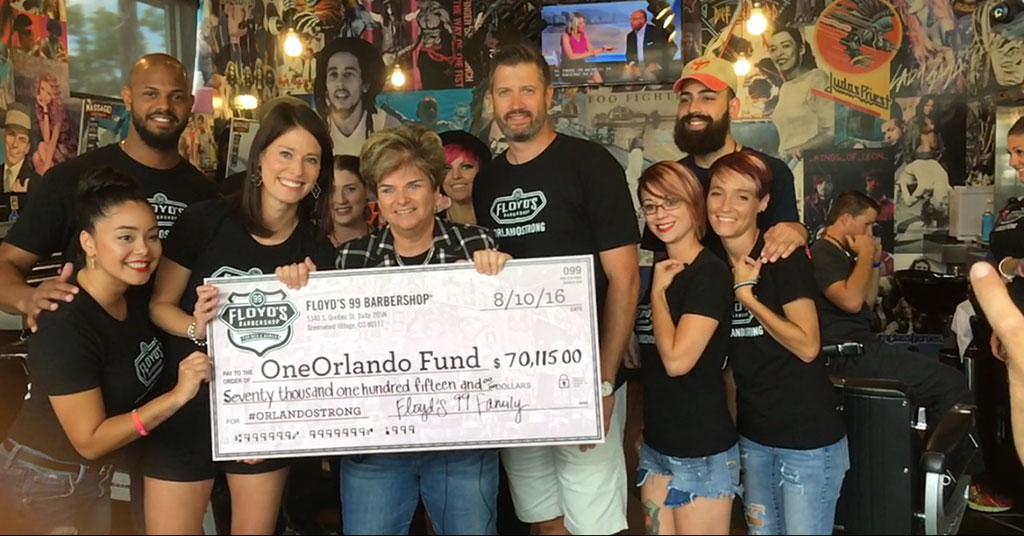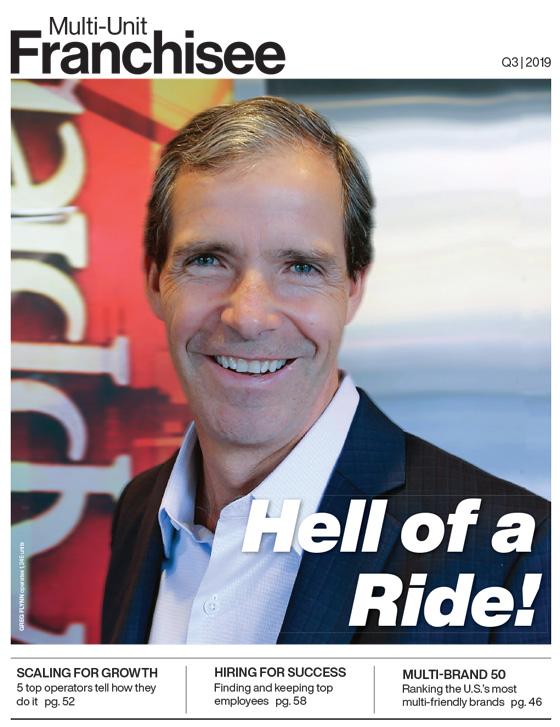Making the Cut: Ex-MLB Pitcher Finds Success in Franchising

One of the proudest moments of Kyle Sleeth's franchising life has been seeing the employees from his six Floyd's 99 Barbershops, along with the entire Floyd's 99 franchise brand, unite after the Pulse nightclub shooting in Orlando in June 2016.
"We raised as much money as we could for OneOrlando, a local nonprofit organization that supported Pulse victims' families and survivors," recalls the 37-year-old. In fact, Floyd's 99 founders, the O'Brien family, along with corporate shops and Sleeth's own Orlando shops, raised more than $70,000.
Sleeth loved seeing his team in action. As a former major league pitcher with the Detroit Tigers organization, he understands the power of teamwork.
The former All-Conference pitcher at Wake Forest University set a number of records on his way to the school's Hall of Fame. He went on to become the third overall pick in the first round of the 2003 MLB draft when the Detroit Tigers selected him. He spent the next 5 years with the organization before retiring in March 2008. He then took a year to finish his college degree (paid for by MLB) before turning to his second career.
He and his wife Sarah looked at all kinds of opportunities, from pizza to wine shops. But it was a meeting with a friend of a friend where they first heard about Floyd's 99 Barbershop, based in his hometown of Denver. "I had never worked in an office before and I didn't want to start," he says. "Floyd's 99 was a way to still be around fun people and give that same energy that I experienced in sports."
Sleeth was drawn to franchising because he saw how it could give him "a blueprint for success with a business model that works." Now, 10 years into his franchising career, he has 6 shops open, employs 130 people, and has 3 more shops in development in his Central Florida territory. He says his goal is to finish building out his market in Central Florida, which he foresees as 10 to 12 shops.
And, 10 years later, Sleeth is still excited to be working alongside his team. "Our goal is to develop some great people in the area to help us build our business and brand."
 Name: Kyle Sleeth
Name: Kyle Sleeth
Title: Managing Partner
Company: Floyd's 99 Barbershop
No. of units: 6 open, 3 in development
Age: 37
Family: Wife Sarah (also a managing partner of our Floyd's 99 shops), daughter 7 who can't wait to have her own Floyd's 99 Barbershop, and a son, age 4
Years in franchising: 10
Years in current position: 10
Personal
First job:
Scraped drywall mud off window sills for my father.
Key accomplishments:
Being inducted into the Wake Forest Sports Hall of Fame, being drafted in the first round by the Detroit Tigers, and owning and operating a successful business with my wife and business partner Sarah.
Biggest current challenge:
Balancing being the father that I want to be while growing a successful company.
Next big goal:
Lock in high-profile sites for our next two locations in Central Florida.
First turning point in your career:
Realizing our growth was exceeding our management manpower.
Best business decision:
Choosing to franchise with Floyd's 99 Barbershop.
Hardest lesson learned:
Not every idea I have is a great one.
Work week:
Constantly interviewing barbers and stylists, too much computer time, followed by as many shop visits as we can squeeze in.
Exercise/workout:
Not as much as I should. I enjoy swimming, playing softball, and golf.
Best advice you ever got:
Don't be afraid to fail or you will never succeed.
What's your passion in business?
Building a team of people who want to work with and for each other.
How do you balance life and work?
It's hard because you are never technically off the clock. We do our best to have family time when the kids are home and take as many vacations as possible.
Guilty pleasure:
Mexican food and wine.
Favorite book:
Outliers: The Story of Success by Malcolm Gladwell.
Favorite movie:
"Goonies."
What do most people not know about you?
I enjoy cooking.
Pet peeve:
Excuses.
What did you want to be when you grew up?
I always wanted to be a baseball player. I was fortunate enough to realize that dream.
Last vacation:
Tuscany, Italy.
Person I'd most like to have lunch with:
John Elway.
Management
Business philosophy:
Trying to do it all by yourself is a recipe for disaster. Build great relationships and help others become successful.
Management method or style:
Lead by example.
Greatest challenge:
Hiring and having effective communications with employees.
How do others describe you?
Laid back and a good sense of humor. One thing sports and the locker room taught me was not to take everything so seriously and always have fun with what you're doing.
One thing I'm looking to do better:
Time management.
How I give my team room to innovate and experiment:
We let them be creative and express their individuality. One thing we do not preach is conformity. We encourage each individual to be their own artist.
How close are you to operations?
Very. We are in constant contact with everyone on our management team. We are very involved with hiring, facilities, payroll, marketing, HR, financials, and accounting--and balance this with spending as much time in the shops as possible.
What are the two most important things you rely on from your franchisor?
Support and industry education.
What I need from vendors:
Timely responses, prompt shipments, and accurate orders.
Have you changed your marketing strategy in response to the economy? How?
Community involvement has always been the biggest marketing tool for us.
How is social media affecting your business?
Social media has been a great way to showcase our shop culture and how talented our employees are. It has also been a great recruiting tool for us.
How do you hire and fire?
All our technical staff go through an in-person interview that I still do. If they pass, my district manager schedules a technical interview where they perform a haircut. She then hires them or gives them advice on what they need to work on. The local shop manager does the terminations after consulting with us and our district manager.
How do you train and retain?
We have a 6-hour new hire class for all incoming employees. We also offer continued industry education for all our employees. Education ranges from product knowledge to changing trends in the industry.
How do you deal with problem employees?
We try to find out what they are motivated by. If we can get to the root of what that individual wants, we are usually able to get them going in the right direction. If they're beyond saving, we let them know we want them to be happy so maybe we're not the best fit.
Fastest way into my doghouse:
Not showing up on time.
Sports & Business
What skills/experience from sports have carried over to operating a business?
Learning from mistakes and challenges and leading by example. I would never ask anyone to do something that I wouldn't do myself.
Which do you find more competitive, sports or business?
I think it is two different types of competiveness. As a pitcher, I always knew who I was competing against. He was always 60 feet, 6 inches away, and my goal was the same for every batter I faced. In business, challenges and competition pop up daily and are rarely alike. At Floyd's 99, our biggest competition is ex-employees, so finding out what makes a quality employee tick and be motivated is crucial to keeping them.
Why did you choose franchising as an investment option?
Throughout my pro career, I knew it wasn't going to last forever and always kept in the back of my head that Sarah and I would start our own business after I retired. An injury put me out for a few years, so I decided to retire early in 2008 and take the leap into entrepreneurship. We liked that franchising gave us a blueprint for success with a business model that works.
How did you transition from sports to franchising?
After retiring, I had a year to finish up college that the MLB paid for. While I was taking those classes, Sarah and I started researching different concepts. We looked at pizza and wine shops, and after meeting with a friend of a friend we heard about Floyd's 99 Barbershop, which is from my hometown of Denver. I had never worked in an office before and I didn't want to start. Floyd's 99 was a way to still be around fun people and give that same energy I experienced in sports.
What was your greatest achievement in sports, and what has been your biggest accomplishment as a franchisee?
In my junior year at Wake Forest I tied the NCAA record for consecutive wins with 26. The record still stands today. One of my proudest moments as a franchisee was seeing our team and the rest of the Floyd's 99 franchise come together after the Pulse shooting to raise as much money as we could for OneOrlando, a local nonprofit organization that supported Pulse victims' families and survivors. Within just a few months, with the support of the O'Brien family (company founders) and the corporate shops, our team was able to raise more than $70,000. The teamwork was really inspiring.
Bottom Line
Annual revenue:
$4.8 to $5 million.
2019 goals:
Identify two high-profile locations for our next shops in Central Florida. Also, look deeper across our stores to identify and develop more managerial support.
Growth meter: How do you measure your growth?
At Floyd's 99, the number of sits or headcount is our top metric. We want to ensure clients are continually coming in, so we look at metrics that measure year over year.
Vision meter: Where do you want to be in 5 years? 10 years?
Our 5-year goal is to finish building out our market here in Central Florida, which we feel is 10 to 12 shops.
How is the economy in your region affecting you, your employees, your customers?
Orlando is exploding with growth. There are a good deal of suburbs blossoming and new interstates to connect them into the city.
Are you experiencing economic growth in your market?
Yes, Orlando has experienced consistent growth since we opened operations in 2010.
How do changes in the economy affect the way you do business?
We decided to get into the hair business because no matter how bad the economy is, people still need haircuts.
What are the best sources for capital expansion?
We've worked with using LMAs and LOCs on our own personal investments. Now that the business is more established, we are able to secure regular commercial bank loans. The first location was paid for by cash.
Experience with private equity, local banks, national banks, other institutions? Why/why not?
We have an LOC for cash flow purposes and a commercial loan that was used for capital for one of our locations.
What are you doing to take care of your employees?
Across our six Central Florida shops, we have 130 employees and offer health, dental, and vision coverage, life insurance, accrued paid time off, and free hair education. Managers also regularly take extensive development training courses.
How are you handling rising employee costs (payroll, minimum wage, healthcare, etc.)?
We have had a few price increases since we opened our doors in Orlando in 2010. We started out as a $19 cut and are currently at $25. Some of those costs we have absorbed but realize they are essential to the success of our employees and company.
How do you reward/recognize top-performing employees?
We find out how each person likes to be rewarded individually. It ranges from something monetary to recognition, or in some cases a few hard-earned days off. It's always important to let them know personally how much they are appreciated.
What kind of exit strategy do you have in place?
Right now, we are in the growth phase of our business and are fully vested. I never say never to anything, but for the foreseeable future our goal is to develop some great people in the area to help us build our business and brand.
Share this Feature
Recommended Reading:
Comments:
comments powered by DisqusFRANCHISE TOPICS
- Multi-Unit Franchising
- Get Started in Franchising
- Growth
- Operations
- Open New Units
- Leadership
- Marketing
- Technology
- Legal
- Awards
- Rankings
- Trends
- Featured Franchise Stories
FEATURED IN

Multi-Unit Franchisee Magazine: Issue 3, 2019
$550,000
$200,000




 The multi-unit franchise opportunities listed above are not related to or endorsed by Multi-Unit Franchisee or Franchise Update Media Group. We are not engaged in, supporting, or endorsing any specific franchise, business opportunity, company or individual. No statement in this site is to be construed as a recommendation. We encourage prospective franchise buyers to perform extensive due diligence when considering a franchise opportunity.
The multi-unit franchise opportunities listed above are not related to or endorsed by Multi-Unit Franchisee or Franchise Update Media Group. We are not engaged in, supporting, or endorsing any specific franchise, business opportunity, company or individual. No statement in this site is to be construed as a recommendation. We encourage prospective franchise buyers to perform extensive due diligence when considering a franchise opportunity.